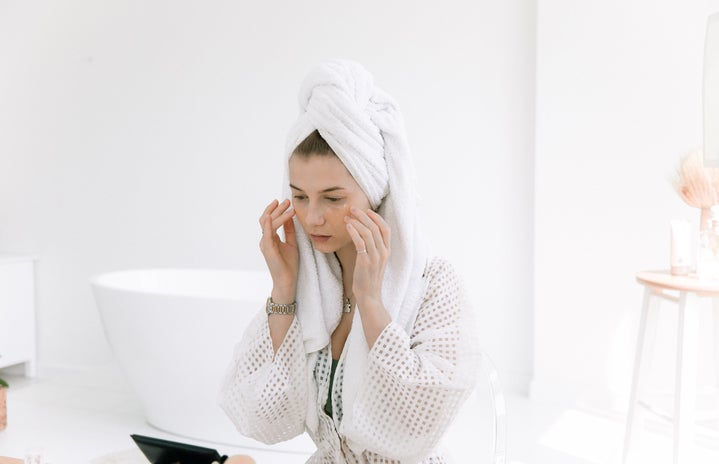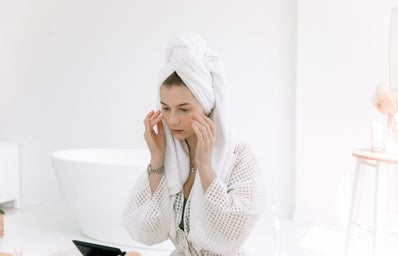If you are like me, you have probably contributed to the anti-aging industry in some way. Whether it was by buying a moisturizer because it could allegedly eliminate wrinkles or by dyeing your hair the minute you see grey hair. In society, why has the default reaction been to cover up the physical symptoms of aging, and how did this become the normal reaction to seeing your age reflected in the mirror?
Anti-aging regimens can historically be dated back to 69 B.C. According to Harper Bazaar’s article “Charting: A Brief History of Anti-Aging,” Cleopatra would take “daily baths in donkey milk…The alpha hydroxy acids in milk are strong exfoliants and skin-softeners.” The same article details how from 1558 to 1603 Elizabethan women would use raw meat to minimize wrinkles on their faces. The article continues by explaining Margaret Kroesen’s 1889 creation of ‘Frownies’ which prevent frown lines after she noticed some on her daughter. Harper Bazaar reported that the first cosmetic hormone cream was sold in 1927 in the United States. Aging intervention techniques have also been very popular among different cultures, such as in traditional Chinese herbal medicine that has anti-aging properties, according to the National Library of Medicine.
If you were to look up ‘anti-aging products’, you would find a long list of results that range from “The 18 best anti-aging skin care products” and “The 20 Best Anti-aging Tips of All Time – Health” to “Unlock Anti-Aging Secrets for Women Over 40”. The common denominator with each search result is they were either advertised by women, for women, or both, either through images, branding, or flat-out saying it.
There is a blatant double standard when it comes to aging, especially when focusing on physical characteristics. For example, when a woman is seen without make-up, she is said to be tired, while a man who isn’t dressed up is described as sexily rugged. When a woman is seen with gray hair, she is encouraged to dye it, while a man is called “a silver fox”. A research journal called Journal of Aging Studies includes an excerpt about the term “double-standard of ageing” coined by Susan Sontag in 1972. Sontag describes “the way that women are deemed to lose their beauty and sexual attractiveness much sooner than are men.” She goes on to say, “Women cannot, unlike men who have both a boyish and a manly or mature template of attractiveness, anticipate a second model of mature beauty, for female beauty and desirability as qualities are judged by the standard of youth alone.”
What the journal and Susan Sontag describe is that in a woman’s mind, age comes with the loss of beauty and sexuality because that was what women have been taught as important throughout their lives. Men can hold onto their attractiveness longer because, in society, it is normal for a grown man with their grey hair and wrinkles to be seen as attractive. This observation has been made in multiple articles, such as 5 Surprising Traits Men Have That Women Find Attractive and 10 Reasons Grey-Haired Men Are Hot, because grey hair on men, according to Metro, is ”a sign of sophistication, maturity and confidence.”
In 2023, you can find publications, including Financial Times, Foreo, and Real Simple that talk about how we are in a pro-aging world. They report that brands have strayed away from “the beauty industry’s ‘anti-ageing’ narrative” by using different marketing and advertising language when selling products. For example, the Body Shop changing their skincare name from ‘Drops of Youth’ to ‘Edelweiss’. I think that it is obvious that there is a change occurring in the perception of aging, but I wouldn’t agree that we are in a pro-aging world today. I think we are in an ‘age gracefully’ world where women are shamed for getting anti-aging procedures instead of “aging on their own terms”. Madonna is a perfect example of this.
Madonna was recently shamed online after images of her at the Grammy’s went viral. According to Marie Claire UK, some headlines reportedly called Madonna, who is 64 years old, “unrecognizable.” One specific, viral tweet stated, “Letting yourself age gracefully is far more beautiful than plastic surgery.”
Now in 2023, instead of shaming women for getting old and showing their age, people are shaming women for doing anti-aging procedures so that they don’t show their age. All because society ingrained a patriarchal mindset when it comes to how aging women are perceived. That’s not progress, that’s repeating history.


